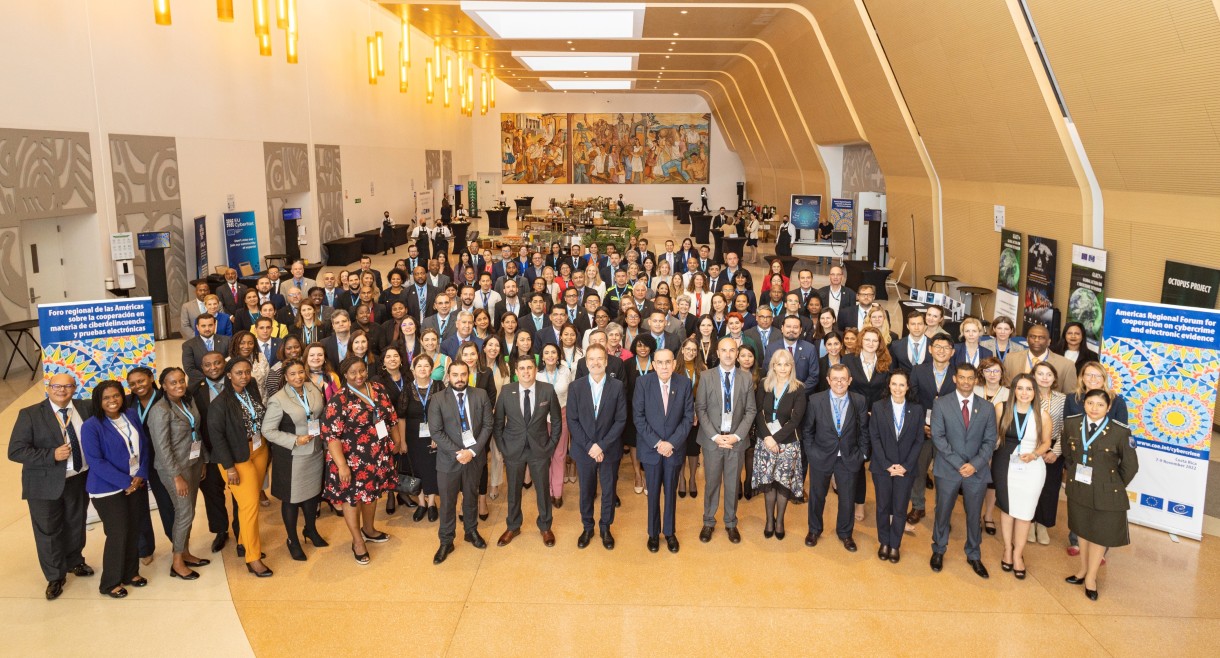Efficient international cooperation has never been more important in enabling an effective and comprehensive criminal justice response to cybercrime and other crimes involving electronic evidence, emphasised participants in the 2022 Americas Regional Forum organised by the Council of Europe in cooperation with the Legislative Assembly and Public Ministry of Costa Rica in San Jose on 7-9 November.
Many countries in Latin America and the Caribbean have made it a high-level priority to develop cybercrime laws and policies and adhere to the Convention on Cybercrime as a means to facilitate efficient and effective international cooperation between criminal justice authorities. Both the Convention and its Second Additional Protocol on enhanced cooperation and disclosure of electronic evidence provide for formal and informal means of international cooperation, while upholding the fundamental rights of individuals.
Speaking during the High-level opening of the conference, Rodrigo Arias Sánchez, President of the Legislative Assembly of Costa Rica said:
"Costa Rica is part of the Budapest Convention since 2017 and we are subscribers to several other international instruments and projects. In addition to having the best treaties and the best legislation, we need to have the best digital infrastructure, as well as having the human resources in cybercrime.
It is also important to remember that FOPREL (Foro de Presidentes y Presidentas de Poderes Legislativos de Centroamérica, la Cuenca del Caribe y México) members, at the seventh ordinary meeting in 2019, made a commitment to promote and support legislators in adhering to the Convention on Cybercrime. This has the effect of adopting a criminal framework for the protection of society against cybercrime. FOPREL is the highest level body in the regional inter-parliamentary sphere, whose objective is to contribute to the strengthening of legal frameworks through exchange, political dialogue and inter-parliamentary diplomacy.”
Carlo Díaz Sánchez, General Prosecutor of Costa Rica, stated:
“By being a Party to the Budapest Convention, our country has acquired a series of legal commitments, in terms of the transformation of our laws and criminal procedures. The Public Prosecutor's Office is the central authority under this treaty.
This year, Costa Rica was the victim of two attacks against its national cybersecurity, targeting the critical infrastructure of several public institutions. The crisis was solved with the help of the Council of Europe and other countries, which provided effective computer tools demonstrating, once again, that the route to countering cybercrime requires international coordination and significant joint efforts. The Forum and the International Conference held in Costa Rica constitute one of these efforts.”
Alexander Seger, Executive Secretary of the Cybercrime Convention Committee and Head of the Cybercrime Programme Office of the Council of Europe underlined:
“Cybercrime is growing both in number and sophistication, a trend only exacerbated by the COVID-19 pandemic. Ransomware has become a major threat to critical infrastructure, to businesses and to democratic institutions, as experienced also by Costa Rica earlier this year. An effective criminal justice response with rapid access to electronic evidence stored in foreign, multiple or unknown jurisdictions is needed.
The Second Additional Protocol further strengthens the tools made available to parties to the Convention on Cybercrime to effectively and efficiently cooperate with each other to investigate, prosecute and adjudicate crimes involving computers and electronic evidence. The Council of Europe stands ready to work with countries across the region to build their capacity to take full advantage of these new powers, in line with fundamental rights safeguards.”
The Americas Regional Forum brings together around 160 participants from 24 countries across the region to share experiences of new cybercrime trends and ways to tackle cybercrime at the regional and international levels, as well as to discuss capacity building needs related to the signature and future ratification of the Second Additional Protocol to the Convention on Cybercrime.
Council of Europe: Americas Regional Forum for international cooperation on cybercrime and electronic evidence (dedicated webpage)
Council of Europe: Convention on Cybercrime
Council of Europe: Second Additional Protocol on enhanced cooperation and disclosure of electronic evidence
Council of Europe: Cybercrime Convention Committee
Council of Europe: Cybercrime Programme Office of the Council of Europe



